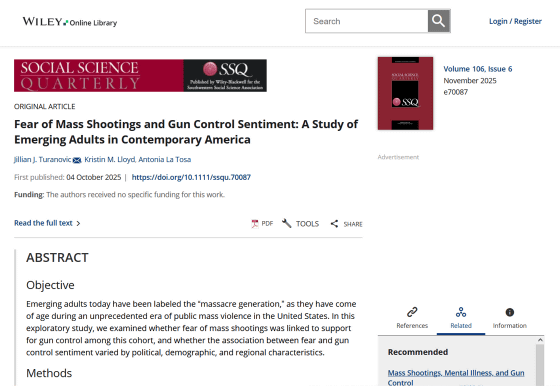Fear of mass shootings may be driving opposition to gun control among young men and Republicans

In the United States, where gun ownership is widely permitted among ordinary citizens, mass shootings are occurring frequently, with one to two occurring per day. It has long been thought that fear of mass shootings leads people to support gun control, but new research shows that this is not necessarily the case.
Fear of Mass Shootings and Gun Control Sentiment: A Study of Emerging Adults in Contemporary America - Turanovic - 2025 - Social Science Quarterly - Wiley Online Library

For young Republicans and men, fear of mass shootings fuels opposition to gun control
https://www.psypost.org/for-young-republicans-and-men-fear-of-mass-shootings-fuels-opposition-to-gun-control/
Mass shootings are becoming more common in the United States, and it has been found that younger generations are more likely to have witnessed a mass shooting. Furthermore, the 'massacre generation,' or those aged 18 to 29, was born and raised during a time when school shootings and mass murders were constantly reported in the media, and is therefore particularly fearful and anxious about mass shootings.
Young Americans are being called the 'mass shooting generation,' with one in 15 people having witnessed a mass shooting, according to a survey.

It is generally believed that the greater the fear of mass shootings, the greater the tendency to support gun control, so as younger generations gain political power, it is expected that movements toward gun control will progress. Therefore, a research team led by Julian Turanovich , an associate professor of sociology at the University of Colorado, Boulder, conducted a survey of young people across the United States.
The survey targeted 1,674 young people aged 18 to 29 living in all 50 states, asking them questions about access to firearms, such as 'Do you think increasing gun ownership would increase safety?' and 'Should guns be allowed on college campuses?' This survey measured participants' attitudes toward gun control.
They also assessed fear of mass shootings by asking participants how worried they were about a mass shooting occurring in a setting like a school, a shopping mall, or a large event.The researchers also conducted statistical analyses, taking into account other factors such as political affiliation, gender, race, and education level.

The survey results showed that over 60% of participants were concerned about the impact of a mass shooting on their lives, indicating that fear of mass shootings is widespread among young people. There was also some correlation between increased fear of mass shootings and support for gun control. However, a more detailed analysis revealed a more complex pattern.
When data were analyzed by political identity, a greater fear of mass shootings was associated with lower support for gun control among young people who identified as Republican or conservative. This suggests that for these people, fear of mass shootings may not lead to calls for government gun control, but rather to a stronger belief in self-defense by 'good guys with guns.'
We also found gender differences. Men and women with low fear of mass shootings had similar views on gun control, but as fear increased, women became more likely to support gun control and men became more likely to oppose it. This may reflect cultural notions that associate 'masculinity' with being the protector or nurturer of the family, where firearm ownership is seen as a way to keep one's family safe.
There were subtle differences across regions, with support for gun control increasing as fear of mass shootings increased in many areas, but the opposite pattern was observed in the Northeast. The researchers speculate that despite the Northeast already having some of the strictest gun control laws in the US, the region continues to experience large-scale mass shootings, leading residents to question the effectiveness of gun control.
'This generation lives with a deep fear and anxiety about mass violence. However, this shared fear does not unify their attitudes toward gun control. In fact, it polarizes them,' Turanovich said.

The findings of this study only show an association, so it is unclear whether fear of mass shootings changes attitudes toward gun control, or whether attitudes toward gun control influence fear. Additionally, while the sample was diverse, it is not fully representative of the American youth population as a whole. Future research could follow individuals over time to better understand how attitudes change, particularly after experiencing a mass shooting in their community.
'Ultimately, this study suggests that the political future of gun control laws may not be as simple as some assume. A shared understanding of growing up in the wake of mass shootings does not automatically create consensus on solutions,' PsyPost said.
Related Posts:
in Science, Posted by log1h_ik






